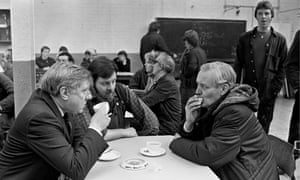From Bob's archive: Hattersley, Benn, Foot and socialism of the heart
I dreamed I saw a tree full of angels, up on Primrose Hill
And I flew with them over the Great Wen till I had seen my fill
Of such poverty and misery sure to tear my soul apart
I've got a socialism of the heart, I've got a socialism of the heart
– Billy Bragg “Upfield”
I was brought up in a Labour Party household and later joined the Party the moment I was eligible, on my fifteenth birthday. In those days – this was the period of public service cuts, of mass unemployment, of the miners’ strike, of police brutality in the inner cities, of the Troubles in Northern Ireland, of the Battle of the Beanfield, a period overcast with the imminent threat of nuclear war – it was clear who the enemy was. Thatcher and her Conservative Party personified all evil, the SDP who had split the Labour vote were traitors who enabled her, and the Liberals were at best a distraction. What was less clear was who our side was.
It took me a while to think that maybe the Labour Party wasn’t who our side was (later, for a while, as I moved much further to the left, I came to see the Labour Party as part of the enemy). In my early teens, the question was: what should the Labour Party be? In the time I was learning about politics, the battle for the soul of the Labour Party had three contestants, the “right” personified by Dennis Healey and Roy Hattersley, the “soft left” personified by Michael Foot, and the “hard left” personified by Tony Benn. (There was an even harder left personified by the Militant Tendency, but I was barely aware of them, and by Labour Briefing, who I only encountered later, when I actually joined the party.
 |
| Benn and Hattersley at a factory canteen in Chesterfield. Photograph: PA |
From a few years later, I have a very vivid memory of travelling several miles with my father to see Michael Foot and his nephew Paul Foot talk about Byron and Shelley in a tiny, damp arts centre. Both of them were wonderful. By this time, however, Foot was an increasingly irrelevant has-been in the Labour Party, never forgiven for his lacklustre period as party leader; the process of “modernisation” was sweeping through the party, squeezing the space for his kind of democratic socialism, a process that in contrast enhanced Tony Benn’s glamour as a focus of resistance to it. .
Although I greatly admired Benn, there was always something about him I didn't trust. Maybe it was his perfect square jaw gripping the ever-present pipe, the icy gleam in his eyes or his aristocratic voice. Maybe it was his frequent double acts with arch-reactionary Enoch Powell, the oft-made claim that he was a “great parliamentarian”, his curmudgeonly-ness, his Euroscepticism, an odour of the Stalinist fellow traveller, or the terminal boringness of the few aging Campaign Group member in my Constituency Labour Party.
Later, there came his Serbophilia, which led him to be very soft on Milosovic, his cozy-ness with Saddam Hussein, or his description of the Afghan and Iraqi insurgents as like Dad’s Army, his claim (in an interview with the fascist propaganda outfit Press TV that “Hamas must be seen as the agent of the Palestinian people” or finally (admittedly fairly trivial) his call for El Al to be banned from British Airports. Eventually, I decided he is more of a malignant force then a benign one.
Over time, even as I moved further to the left than Benn, it was oddly Hattersley that left more of a mark on me. I have no idea of the occasion, or even if it was on TV or the radio, but I remember him talking about how he became a socialist. I reproduce these words, as best as I can, from memory. He described his first job assisting a milkman, describing the rounds in the alleyways behind the brick terraced houses of whatever part of Sheffield it was. There was a woman on the round, maybe a single mother – perhaps a widow – who struggled to pay for her milk. The milkman would carefully take off the foil top of a bottle, pour it into a can for her, replace the top, then smash the bottle to claim it as a breakage. This, Hattersley said, was my first exposure to socialism. The story had a slight twist, though, because the milkman then said, I oughtn’t to do that, as she’ll probably just spend the money on fags. Hattersely paused, then said, And this was my first exposure to the idea of the undeserving poor. I rejected it then, and I reject it still. (I just found a more recent Hattersley interview, where he says more or less the same thing. Read it.)
Over two decades later, after a complicated journey that took me a long way from Roy Hattersley’s politics, I still hold to some version of the socialism of the heart carried in that memory.

Comments
https://beta.charitycommission.gov.uk/charity-details/?regid=1107341&subid=0
How much money is really spent on their travel and political activism, needs investigation? Why does this charity turn over so many staff?